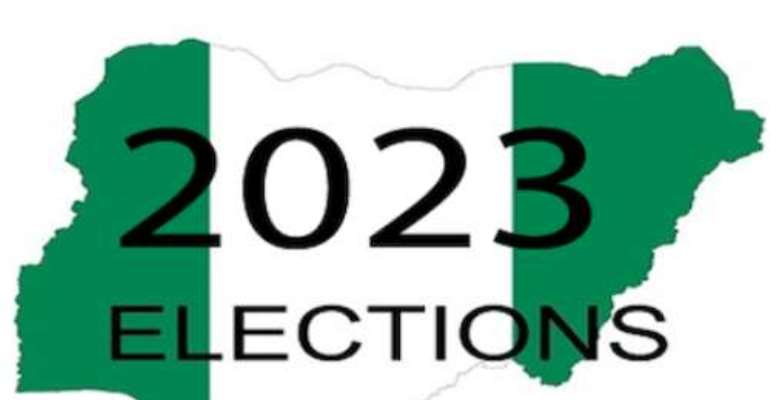2023 Election Campaigns And The Talking Points

The campaigns for the 2023 general elections are already here. However, I already see a pattern repeating itself.
Since the return to democracy in 1999, Nigeria has had six general elections. The campaigns at these elections have always had Nigeria trouping to campaign venues to dance with politicians. While these go on, issues are relegated to the background. After dancing at these venues, Nigerians grapple with endless pains and anguish when the politicians attain political power and start running the country aground.
Another pattern that is reoccurring is the choice of candidates. Over the past years, Nigerians have not had the benefit of selecting from a retinue of candidates based on ideology. No party in Nigeria has a clear cut ideology anyway. Therefore, what most people do is to pitch their tent with a candidate they perceive would perform. The result so far has shown that perception is not enough.
The campaigns for next year’s elections must be issue based. Aspirants for political offices must address issues head on by providing practical solutions to the challenges in the country. This is a first part of a series, where I intend to discuss areas I think should be the focus with the hope that Nigerians would engage them in these areas. I must hasten to add that this is by no means exhaustive and I do not lay claim to all answers. This is only an attempt to refocus the minds of Nigerians and ensure that political campaigns become talking points; one focused on cogent issues.
Over the years, Nigeria has grappled with immense poor power supply. All the investments in the power sector by the previous government have not yielded positive impacts. Despite the huge amount spent, Nigeria’s power generation is still less than 20,000 megawatts with less than 5000 megawatts distributable (accentuated by the low capacity of distribution companies). This is grossly inadequate for a country with a population of about 200 million people.
Electricity is used in all fields of human activity; from the welder on the streets to large manufacturing companies. Stability electricity translates into cost effective production and jobs for a majority of people and improved standard of living for the majority of Nigerians. A lack of it translates into business collapse and lack of jobs; infrastructural collapse, pollution, and increase in poverty etc.
No serious country can advance without a stable power supply. Leaders and aspiring leaders must make that sector a priority. Any politician hoping to be voted for as president during the 2023 presidential election must present practical solutions to the electricity needs of the country. It is so dire that Nigerians should not wait for elections to be concluded before asking tough questions about the sector. They must demand to know the plans to improve generation, capacity, distribution and a prevention of incessant collapse of the national grid.
There are countries in Africa that have achieved 100% electricity access for their citizens. Nigeria cannot pride itself as the giant of Africa, while the majority of her citizens live in darkness. Our inability to meet the electricity needs of our people makes us a mockery of Africa. Countries such as Egypt, Morocco and Tunisia have achieved 100% electricity access for its people. Apart from Tunisia, they rely on renewable energy. We should learn from them and diversity too.
President Buhari's administration with Siemens is probably yielding results already, as certain infrastructures are being imported into the country. Aspirants must tell Nigerians how they intend to build on this and not let it go down the drain with the end of the administration like previous projects that did not survive beyond their administrations.
Investing in the power sector is not cheap. Aspirants should discuss the incentives it will put in place for investors who are interested in the area. We must break monopoly and encourage diversity. States should be allowed to generate electricity either for their own consumption or distribution and not what currently obtains where any megawatt generated must be sent to the national grid. All these should form talking points at political campaigns.
Nigerians should prepare to go to election campaign venues to engage and not enjoy the beats of music and drums or echoes of rhetoric. We must ask difficult questions which are not geared towards ridiculing candidates, but questions that will aid us in assessing them in order to make an informed decision of who to vote for.
In the past, election debates have been conducted for candidates. This in my opinion is inadequate. Only a few have the opportunity to attend in person and many do not have power to watch it on television and many people are not given the opportunity to phone in with their questions. Every election cycle must be an improvement of the previous one. This is why I am worried about the recurring pattern of emotions, jollification and dance steps that may be the common features of this election circle. Have we learned any lessons from the past?
The appropriate time to constructively engage leaders is during campaigns and not only when they have attained political power. An army of patriotic Nigerians must make the sacrifice of reawakening this consciousness in Nigerians.
If we do this, electoral aspirants would spend more time researching on the electoral messages and not on rehearsing on how to dance at campaign venues. God bless Nigeria.
This is the first part of a series. Stay with me
Frank Ijege [email protected]
